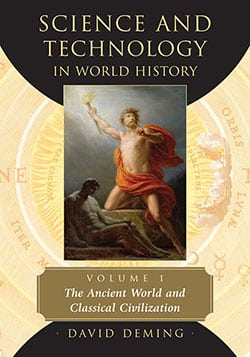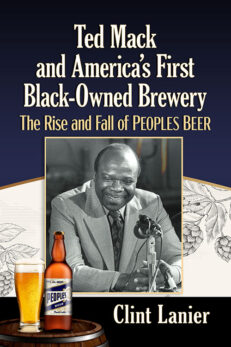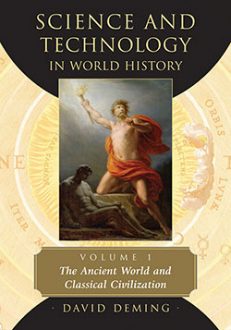Science and Technology in World History, Volume 1
The Ancient World and Classical Civilization
$39.95
In stock
About the Book
Science is a living, organic activity, the meaning and understanding of which have evolved incrementally over human history. This book, the first in a roughly chronological series, explores the development of the methodology and major ideas of science, in historical context, from ancient times to the decline of classical civilizations around 300 A.D. It includes details specific to the histories of specialized sciences including astronomy, medicine and physics—along with Roman engineering and Greek philosophy. It closely describes the contributions of such individuals as Pythagoras, Hippocrates, Socrates, Plato, Aristotle, Alexander the Great, Euclid, Archimedes, Ptolemy, Seneca, Pliny the Elder, and Galen.
About the Author(s)
Bibliographic Details
David Deming
Format: softcover (7 x 10)
Pages: 275
Bibliographic Info: notes, bibliography, index
Copyright Date: 2010
pISBN: 978-0-7864-3932-4
eISBN: 978-0-7864-5657-4
Imprint: McFarland
Table of Contents
Preface 1
Introduction 7
Science, Religion and Epistemology 7
Before the Greeks 9
1. The Greeks (c. 600–300 B.C.) 15
Intellectual Freedom, Naturalism, and Demonstration 16
The Ionians (c. 600–400 B.C.) 18
Pythagoras (c. 569–475 B.C.) 29
Parmenides (c. 520–450 B.C.) and the Eleatics 35
Empedocles (c. 492–432 B.C.) 37
Hippocrates of Cos (c. 460–370 B.C.) 40
The Greco–Persian Wars (c. 499–448 B.C.) 48
Socrates (470–399 B.C.) 62
Plato (428 –348 B.C.) 71
Philip (382–336 B.C.) and Alexander (356 –323 B.C.) 86
Aristotle (384 –322 B.C.) 101
2. Hellenistic Science (c. 300 B.C.–A.D. 200) 122
The Ptolemaic Kings 122
Euclid (c. 325 –265 B.C.) 127
Strato of Lampsacus (c. 340–270 B.C.) 128
Aristarchus of Samos (310–230 B.C.) 131
Eratosthenes (276–195 B.C.) 133
Archimedes (287–212 B.C.) and the Punic Wars (264–146 B.C.) 136
Hipparchus (c. 190–120 B.C.) 158
Claudius Ptolemy (c. A.D. 100–170) 160
3. Roman Engineering 170
Lack of Originality in Science and Philosophy 170
Concrete and the Arch 171
Roads 172
Aqueducts 174
Baths 174
Sewers 175
Bridges 175
4. The Roman Writers 178
Vitruvius Pollio: On Architecture (c. 30 B.C.) 178
Lucius Annaeus Seneca (c. 4 B.C.–A.D. 65) and Nero (A.D. 37–68) 181
Pliny the Elder (A.D. 23–79) 191
Galen (c. A.D. 129 –200) 195
5. Hellenistic Philosophy in Rome 204
Epicureanism (c. 300 B.C.–A.D. 300) 204
Stoicism (c. 300 B.C.–A.D. 200) 209
Neoplatonism (c. A.D. 250–550) 215
Conclusion 219
Chapter Notes 221
Bibliography 255
Index 263
Book Reviews & Awards
“interesting…recommended”—Choice.





